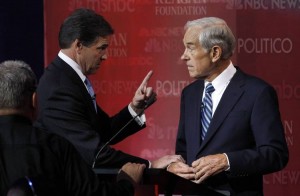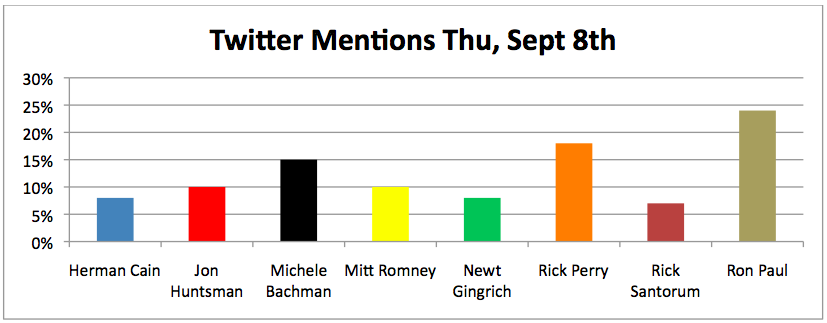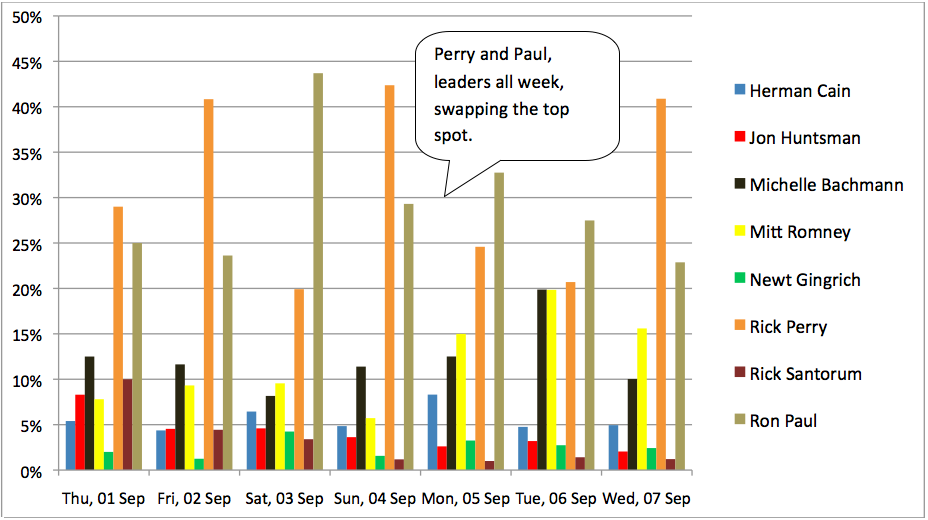PRE-DEBATE (September 1st – September 7th)
 It’s September again, summer vacations have ended, schools are back in session, and the presidential primary election campaign is in full swing. While Zogby International and Gallup polling may tell you that Perry and Romney are the favored Republican, you shouldn’t be so sure. Results generated from Twitter data via DiscoverText are in for the first week of September: Rick Perry was the talk of the town, however Romney is nowhere close to Perry – at least on Twitter.
It’s September again, summer vacations have ended, schools are back in session, and the presidential primary election campaign is in full swing. While Zogby International and Gallup polling may tell you that Perry and Romney are the favored Republican, you shouldn’t be so sure. Results generated from Twitter data via DiscoverText are in for the first week of September: Rick Perry was the talk of the town, however Romney is nowhere close to Perry – at least on Twitter.
Of the eight Republican candidates (at Wednesday’s debate), Rick Perry has attracted more attention on Twitter in the last week than any other candidate – by far. Sure, any press is good press, in this case it’s not exactly press. These are real people with real sentiments – positive, negative, and neutral. Either way, people are talking and Rick Perry and Ron Paul are who they’re talking about.
Despite low polling numbers and sparse media attention, Dr. Ron Paul is neck and neck with Perry, and even three times (on 9/3, 9/5, and 9/6) surpassed Perry’s twitter mention-count. Battling for third place in the mention count were former Massachusetts governor Mitt Romney and Minnesota Congresswoman Michele Bachmann. Businessman Herman Cain held the spot for fifth. Rounding out the field, at the bottom of the pack were Jon Huntsman, Newt Gingrich, and Rick Santorum.
This Twitter poll conducted by Texifter analysts accounts for all mentions of candidates, regardless of sentiment. It is no surprise that prior to the GOP debate, Rick Perry held the lead for mentions on Twitter. Since entering the race two weeks ago, Perry has been the center of Republican attention. The Texan began his campaign by insulting Chairman of the Federal Reserve, Ben Bernanke, and has not relented in his unique political candor, which has brought him to the top of many national polls. Perry has drawn comparison to former President George W. Bush, because of his Texas roots, lackluster academic career, and his “good ‘ole boy” looks and charm.
But it is Ron Paul’s second place status that leaves room for debate. Ron Paul is a candidate that tows neither the Democratic or Republican party line. He advocates for both isolationist foreign policy and archly conservative fiscal policy, and receives a fraction of the media attention that his fellow candidates receive. And his polling numbers don’t account for all of this twitter attention, which ultimately will make a political impact.
POST-DEBATE (September 8th)
The day after the debate, Twitter mentions of Republican Presidential candidates soared, as the energy of the debate brought about vibrant online discussions. While many of the pundits and newspapers reported on the battle between Mitt Romney and Rick Perry, it was Rick Perry and Ron Paul that traded places for top mentions, prior to the debate. On Thursday, September 8, Ron Paul re-captured the lead, taking 23% of the Twitter mentions. Rick Perry, having captured slightly over 40% of the mentions on the 7th captured roughly 18% of the mentions.
 In addition, the range of twitter-mentions following the debate substantially decreased following the debate. This is apparent by looking at the range between the most mentions and the least mentions. On September 7, the range between the most mentions and least mentions was 38%, but on September 8 that range fell to only 15%.
In addition, the range of twitter-mentions following the debate substantially decreased following the debate. This is apparent by looking at the range between the most mentions and the least mentions. On September 7, the range between the most mentions and least mentions was 38%, but on September 8 that range fell to only 15%.
In the contest for third place, more changed following the debate. Mitt Romney, who held 3rd place on September 7, lost his position to Michele Bachmann, who ended the day with 13% of the day’s mentions. Mitt Romney slipped to 5th place, virtually deadlocked with Jon Huntsman, who also held 10% of mentions. While this may be alarming for the Romney campaign, he has seen drastic fluctuations in the past week. Romney fluctuated between 5% and 20% of mentions; this 15% spread is second only to Rick Perry, who has held between 20% and 40% of the candidate mentions throughout the week. As for Jon Huntsman, he experienced a higher percentage of mentions after the debate than he experienced all week. He consistently received less than 10% of all mentions, and, on multiple days, only generated roughly 3% of candidate mentions. For Herman Cain, Jon Huntsman’s gain reflects Cain’s loss. Cain slipped into the band of bottom feeders, along with Newt Gingrich and Rick Santorum.
Texifter analysts have been collecting Twitter feeds mentioning Republican candidates vying for the party’s nomination. Feed collection began in late August, and will continue to import data throughout the Fall. This will undoubtedly give Texifter analysts new insights into the campaign. For the next 3 months, Texifter will continue to update the blog with posts regarding these feeds. Within the next two weeks, analysts will monitor sentiment and topics discussed by each candidate. Check back with the Texifter Blog soon to see the results of this next experiment. If there are any questions or comments, or something you might like to see, do not hesitate to email any of the Texifter staff.




Pingback: Republicans Battle it Out on Twitter | Texifter, LLC. Blog « Politics And Funds
Pingback: Perry Loses Major Ground Post Debate(Should be ready to go) | Texifter, LLC. Blog